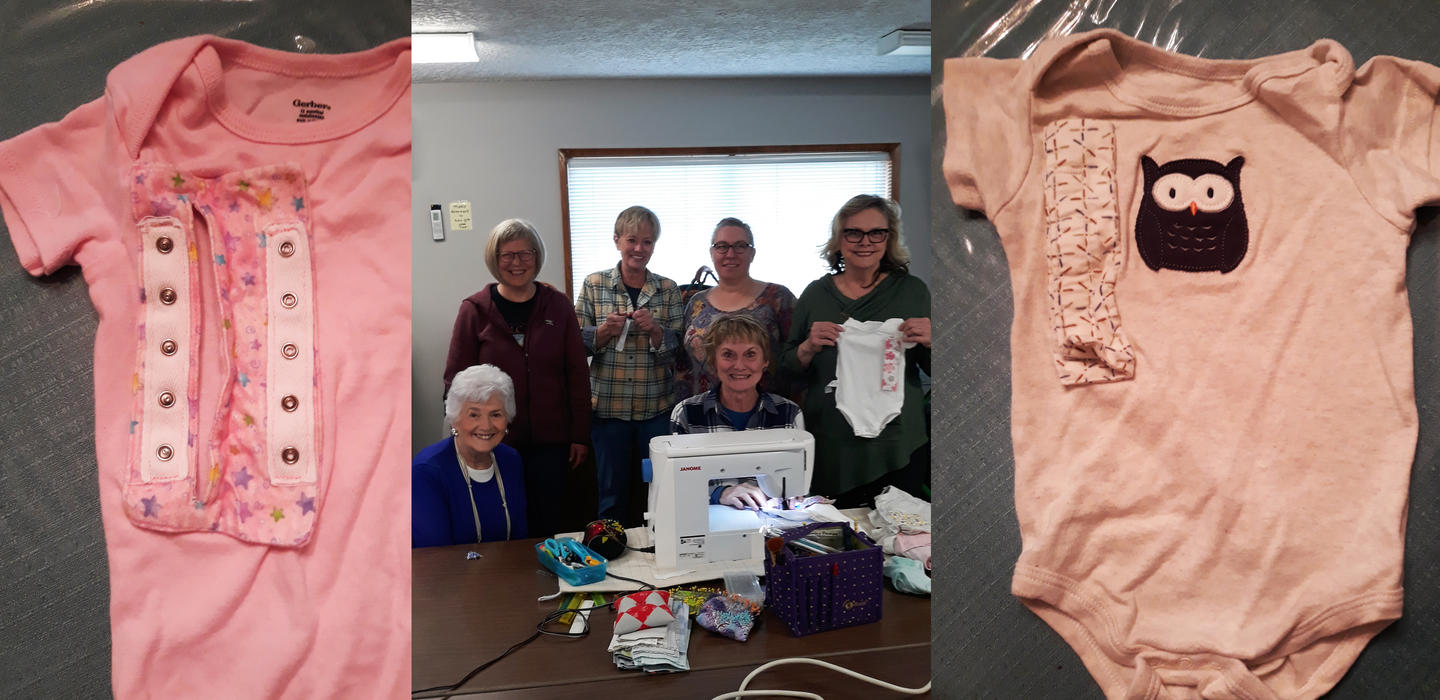La Center Lion Edie Brannon in Washington, USA read on Facebook that a local woman was looking for the help of a seamstress. She probably needs something hemmed, or a button repositioned, thought Brannon, who had fulfilled those simple requests many times before.
They are just so happy to not be sewing masks,” says Brannon. “And they work like bees.
But this was no quick fix. The woman was helping a friend in Tennessee find adaptive clothing to keep her 7-month-old daughter warm during her chemotherapy infusions. The rooms are purposely kept cool, staff need access to the chemo port on the baby’s chest, and babies have a knack for kicking off the blankets intended to keep them warm. That leaves them with just a diaper.
Brannon verified what she’d been told. There was no adaptive clothing sold for children smaller than a toddler size 4. So, undaunted, she sat at her sewing machine, remembering how she had made a sweatshirt with a zipper for her husband when he had kidney dialysis. With one of her grandson’s onesies, she made her first adaptive onesie—what was the first of many “Wonderful Onesies” to come.
Brannon mailed her prototype off to the mother in Tennessee for feedback, made adjustments and sought input from other sewer-artists (“sewists”) and fellow Lions, continuing to improve her design. Then she ventured out to show her work to pediatricians at the Vancouver Clinic. The reviews could not have been better. She sat back down and sewed 100.
All the onesies are new, washed and sterilized. A simple lined buttonhole on the right chest with a 7-inch placket like a pocket flap is what turns a regular US$1 to US$3 wardrobe staple into a Wonderful Onesie. It keeps baby covered and allows room for an adult hand to easily access the port.
Brannon took her project to the La Center Lions where she is first vice president, then to other MD19 clubs where they were eager to help. With a US$500 grant from Walmart, the Camas Lions Foundation took her shopping for onesies and supplies. The Vancouver Lions Club held a “Onesie Round Up,” collecting 50 onesies and making a US$50 contribution. The Salmon Creek Lions donated US$250 and reimbursed members for the onesies they’d purchased. Numerous individuals contributed in different ways. All onesies and fabrics are either donated or purchased by grant funds, says Brannon.
After meeting the Salmon Creek Lions via Zoom, Lion Kay Hurst introduced Brannon to her quilting group, the North Star Quilt Guild. Brannon met with the guild, providing several dozen onesies along with sewing supplies, but guild members went out and purchased more, making close to 300 Wonderful Onesies.
“The finished product is adorable. They used their quilt fabric stashes and matched the onesie color to their stash fabric perfectly. They are just so happy to not be sewing masks,” says Brannon. “And they work like bees.”
By the start of 2023, Brannon and her helpers had made Wonderful Onesies available through Randall Children’s Hospital and OHSU Doernbecher Children’s Hospital, both in Oregon, and they hoped to be introduced at hospitals in the Seattle area. Eventually, she hopes Wonderful Onesies will be accepted at St. Jude Children’s Research Hospital in Tennessee. At Doernbecher, they asked if she could also make something for children going through dialysis while awaiting a kidney transplant.
“Long-term, I think Wonderful Onesies could go national with the right shepherd,” she says. “We intend to form a group of dedicated Lion Wonderful Onesie-ists.
“No one will ever be charged in any way for a Wonderful Onesie. They will never be sold. These are a gift. Childhood Cancer is one of Lions’ global concerns and Wonderful Onesies are our response to a common need,” says Brannon.
“These poor moms don’t have a lot of control over their baby’s diet, their baby’s medication, their schedule. They are at the mercy of the cancer. If we can lighten that burden in any way, we want to.”
See “Wonderful Onesies” on Facebook or email ChemoOnesiesfromLions@gmail.com if you need one. If you sew and would like to help create Wonderful Onesies, leave a comment on the Facebook page.
Joan Cary is the assistant editor of LION Magazine.
The coronavirus (COVID-19) pandemic has impacted communities around the world in different ways. To ensure we’re serving safely wherever we live, Lions should follow the guidelines of the Centers for Disease Control, World Health Organization or local health authorities. Visit our Serving Safely page for resources that can help you safely serve your community.

